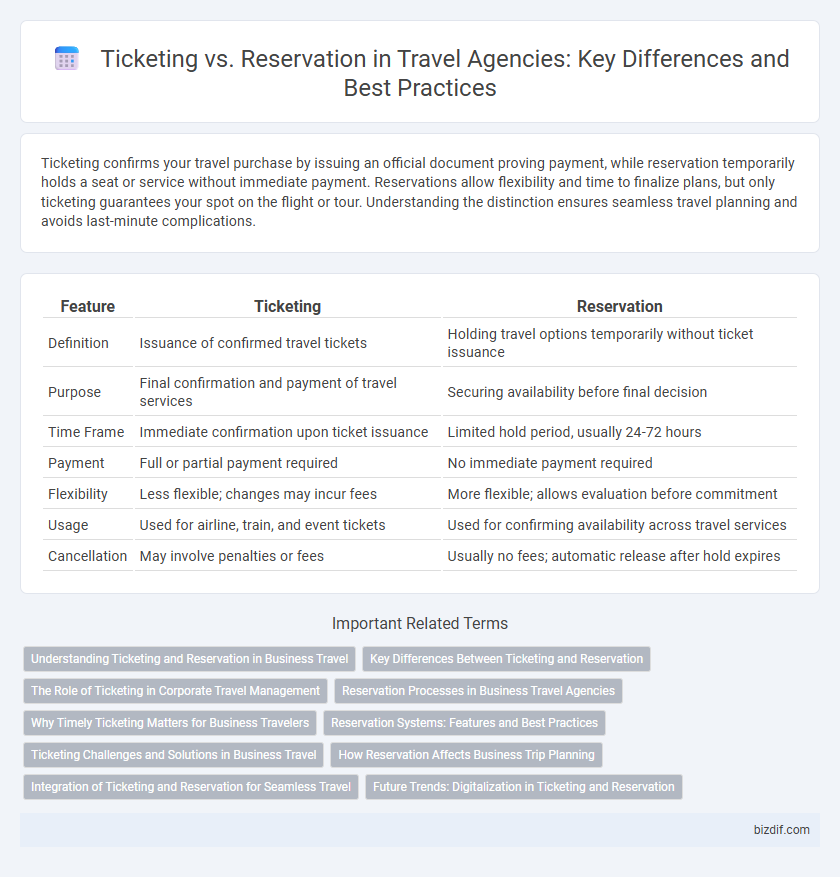Ticketing confirms your travel purchase by issuing an official document proving payment, while reservation temporarily holds a seat or service without immediate payment. Reservations allow flexibility and time to finalize plans, but only ticketing guarantees your spot on the flight or tour. Understanding the distinction ensures seamless travel planning and avoids last-minute complications.
Table of Comparison
| Feature | Ticketing | Reservation |
|---|---|---|
| Definition | Issuance of confirmed travel tickets | Holding travel options temporarily without ticket issuance |
| Purpose | Final confirmation and payment of travel services | Securing availability before final decision |
| Time Frame | Immediate confirmation upon ticket issuance | Limited hold period, usually 24-72 hours |
| Payment | Full or partial payment required | No immediate payment required |
| Flexibility | Less flexible; changes may incur fees | More flexible; allows evaluation before commitment |
| Usage | Used for airline, train, and event tickets | Used for confirming availability across travel services |
| Cancellation | May involve penalties or fees | Usually no fees; automatic release after hold expires |
Understanding Ticketing and Reservation in Business Travel
Ticketing in business travel refers to the issuance of a confirmed travel document that guarantees a passenger's seat and payment, enabling actual travel. Reservation secures a place or seat temporarily without payment confirmation, serving as a preliminary booking that holds availability for the traveler. Understanding the distinction is critical for corporate travel management to optimize costs, ensure compliance with travel policies, and avoid last-minute booking issues.
Key Differences Between Ticketing and Reservation
Ticketing confirms a traveler's purchase and provides an official document enabling travel, whereas reservation merely holds a seat or service temporarily without payment confirmation. Ticketing involves issuing a binding contract with specific travel details and payment finalized, while reservations often allow changes or cancellation before ticket issuance. The key difference lies in ticketing's role as proof of purchase and travel entitlement, compared to reservations which guarantee availability but not a finalized transaction.
The Role of Ticketing in Corporate Travel Management
Ticketing in corporate travel management ensures confirmed and prepaid travel arrangements, providing travelers with valid proof of purchase and enabling precise expense tracking and budgeting. Unlike reservations, which hold a booking temporarily without payment, ticketing finalizes the transaction, reducing last-minute cancellations and improving travel policy compliance. Efficient ticketing processes streamline approval workflows and enhance reporting accuracy for corporate travel administrators.
Reservation Processes in Business Travel Agencies
Reservation processes in business travel agencies involve securing space or seats on flights, hotels, or transportation for clients without immediate payment. These agencies use Global Distribution Systems (GDS) like Amadeus or Sabre to access real-time availability and hold bookings until clients confirm purchase. Efficient reservation management supports corporate travel policies by ensuring flexibility and optimizing travel budgets before ticket issuance.
Why Timely Ticketing Matters for Business Travelers
Timely ticketing ensures business travelers secure preferred flights and avoid last-minute price surges, optimizing budget and schedule efficiency. Early ticket issuance guarantees confirmed seats, reducing risks of itinerary disruptions and missed meetings. Efficient ticketing aligns with corporate travel policies, enabling seamless expense tracking and compliance management.
Reservation Systems: Features and Best Practices
Reservation systems in travel agencies streamline booking processes by allowing real-time availability checks, secure customer data storage, and automated itinerary management. Key features include multi-channel integration, dynamic pricing, and seamless payment gateways that enhance customer experience and operational efficiency. Best practices emphasize regular system updates, robust data encryption, and comprehensive staff training to maximize accuracy and customer satisfaction.
Ticketing Challenges and Solutions in Business Travel
Ticketing in business travel faces challenges such as fluctuating fare prices, last-minute itinerary changes, and complex corporate travel policies that require flexible ticket management. Solutions include implementing advanced ticketing software with real-time fare monitoring, automated rebooking systems, and integrated expense tracking to streamline travel management. Leveraging data analytics helps travel agencies optimize ticket purchases, ensuring compliance and cost-effectiveness for corporate travelers.
How Reservation Affects Business Trip Planning
Reservation systems streamline business trip planning by securing preferred flight options and accommodations in advance, reducing uncertainty and enabling better itinerary management. Efficient reservations help travel agencies coordinate multiple bookings, optimize travel routes, and anticipate client needs, enhancing overall satisfaction and productivity. Unlike ticketing, which finalizes travel documents, reservations provide flexibility to adjust plans before confirmation, crucial for dynamic business schedules.
Integration of Ticketing and Reservation for Seamless Travel
Integration of ticketing and reservation systems streamlines the travel process by enabling real-time updates and instant confirmation of bookings. Automated synchronization between these platforms reduces errors, minimizes double-booking, and enhances customer experience through immediate ticket issuance. Leveraging APIs for unified data management ensures efficient communication between airlines, hotels, and travel agents, fostering seamless travel journeys.
Future Trends: Digitalization in Ticketing and Reservation
The future of ticketing and reservation in travel agencies is heavily driven by digitalization, with AI-powered platforms streamlining booking processes and enhancing customer experience. Blockchain technology is emerging to ensure secure, transparent transactions, reducing fraud and enabling instant ticket verification. Mobile ticketing apps and real-time reservation systems are becoming standard, allowing travelers to manage bookings with greater flexibility and convenience.
Ticketing vs Reservation Infographic

 bizdif.com
bizdif.com